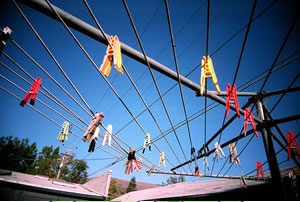- 2 reads

Every step we take to clean our laundry - the detergent we use, our washers, our dryers - can have a harmful impact on the environment. Follow these healthy laundry options to turn to eco-friendly laundry.
Detergent
The ingredients in our laundry cleaners are more harmful than most people realize, due to government laws that do not require them to be published. Recently, however, many of the harmful ingredients have been identified, and are listed here:
- Nonylphenol ethoxylates (NPEs) are chemicals that break down dirt and grime. They may do a great job for our dirty clothing, but the job they do on the environment is far worse.
- Linear Alkylbenzene Sulfonate’s (LASs) are also a common ingredient in laundry detergent.
Both NPEs and LASs and belong to a family of harmful compounds called Alkylphenol Ethoxylates (APEs). APEs are very dangerous for the environment; they are known to reduce oxygen in water and harm the reproduction of aquatic life, like fish.
The APE Research Council published findings in 1999 that reported the chemicals in the APE family were biodegradable, could be removed through wastewater treatment, and the concentration of APEs in rivers and lakes was low enough that they would not have a harmful impact on aquatic life. Less than 10 years later, research done by the Sierra Club and other research facilities publish dramatically different results.
NPEs are, fortunately, being slowly being phased out of laundry detergents. To make healthier laundry options:
- Choose the simplest product. Dyes and fragrances do nothing in terms of how well clothes are cleaned.
- Purchase eco-friendly laundry cleaners from companies that use organic products, such as Seventh Generation, Ecover and Bi-O-Kleen
- Make your own detergent using organic soaps as a base, washing soda to cut grease, borax for stain removal, and baking soda or white vinegar as fabric softeners, natural bleach and static reducers
- Use chlorine-free bleach
Washers
The bathroom is the room in the house that uses the most water, but your washer can run a close second. A washing machine can use up to 40 gallons of water per load! The excess water use is having an enormous impact on the environment, as more water is being pumped for groundwater supplies, which leads to freshwater being infiltrated by saltwater. That infiltration has already caused almost 5 percent of native marine species to be displaced.
- Switch from liquid detergent to powder. Liquid detergents use a significant amount of water, which is unnecessary, as the washer adds water on its own.
- Set your washer on the fastest spin cycle, reducing the amount of water consumed for the entire load.
- Make sure each load of wash is a full load, and do as little loads as possible.
- Invest in a water-saving washer. Energy-Star? rated washing machines use half the amount of water as conventional washers.
Dryers
To turn to eco-friendly laundry, the dryer may be the best place to start. Line-drying your clothing is easy, effective and free. Sunlight is the most effective way to dry your clothing; even air-drying clothes in cooler air is a great option, as it reduces the amount of wrinkles.
- Invest in a dryer with more efficient drying choices, such as a moisture sensor that automatically shuts the dryer off when clothes are dry, or an air-dry setting that dries your clothing with colder air (reducing the amount of wrinkles, in turn reducing the necessity of that iron!)
- Energy-Star? recommends gas dryers, which are cheaper to run than electric.
- Remove your clothing from the dryer immediately after its cycle, again lessening the necessity of your iron, which in turn saves even more energy.
You don’t have to buy new appliances to have healthy laundry cleaners. It helps to buy a water-saving or energy-reducing washer and dryer, but it’s not your only option. Eco-friendly laundry is easily obtainable with the right information, and to get an idea of which appliances might be best for you, take a look at GREENandSAVE.com’s Green Appliances section.

